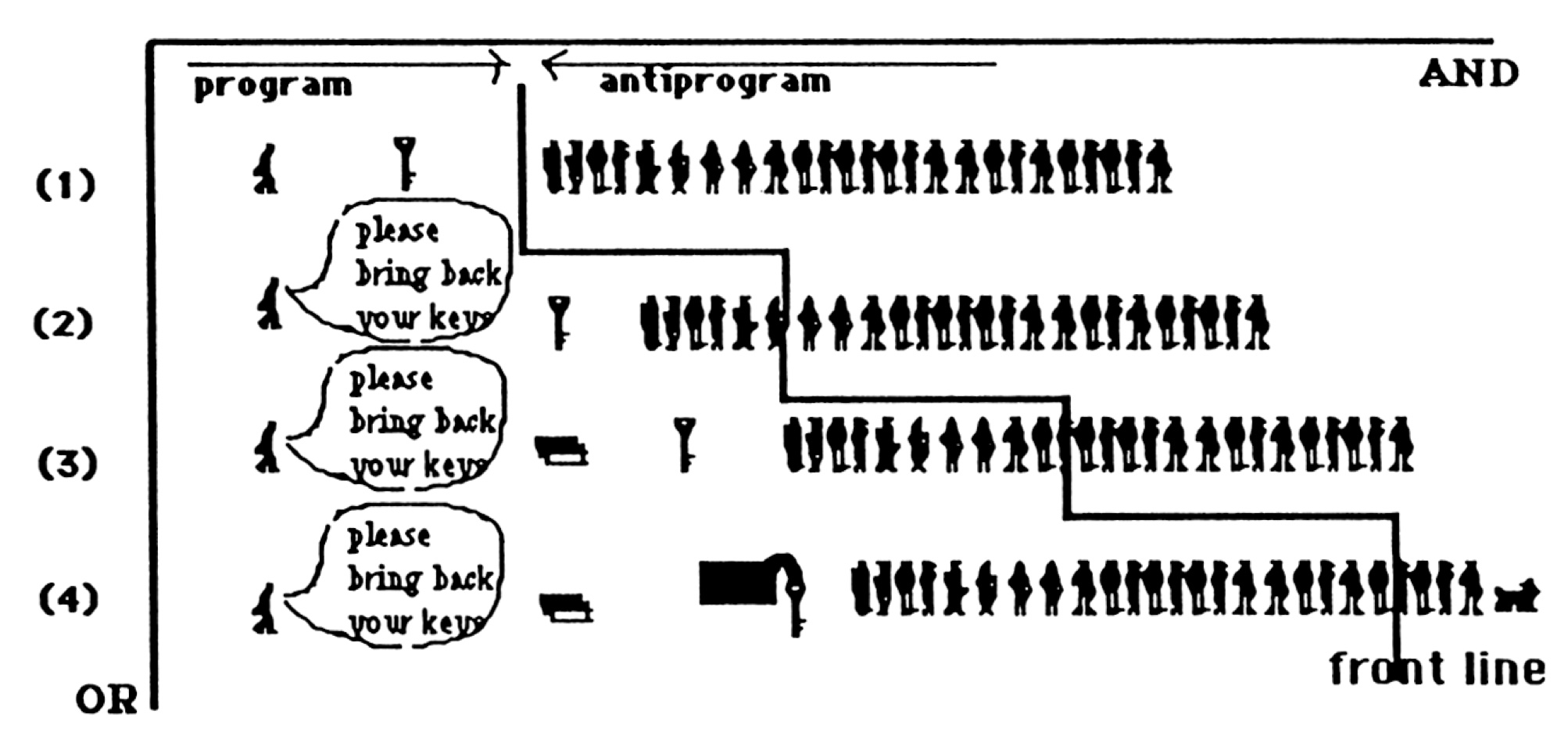
(Im)possible Images – digital media, reality and the arts
The production of visual images is not a process of mere depicting and representing reality, but a process of creating and mediating realities. Visual images shape certain conceptions of the enemy, define specific ways of life, call for identification with given groups (perpetrators, victims, etc.), frame opinions, make the hidden visible and conceal the visible. Visual images are performative and under particular circumstances even operative in a way that they can trigger certain decisions and actions (“operational images” Farocki 2003).
This operativity and performativity unfolds in a new way through the producing and reading of visual images by new technologies such as computer vision, neuronal networks, virtual reality, augmented reality etc. It is the algorithms that produce, read and evaluate the images by translating and comprehending the „visuality“ into data sets and mathematical formulas. Monitoring systems and face recognition algorithms turn the human body into a machine-readable and image-based grammar in order to make visible the “unwanted” (“criminals”, “vandals”, “illegals”) and to sort it out. Filtering algorithms decompose body images into small entities in order to make invisible the 'unwanted' and to filter it. Drones assess the images they generate in order to navigate through terrain and wipe out the target, artificial intelligence creates pictures of people, or entities, who never exist. At the same time artificial intelligence is designed in order to recognize the “real” from the “fake” persons, or entity. Taking into account that visuals and visual regimes are both ubiquitous and hidden, especially considering new computer generated black box methods of image processing and assessment, the question arises how to critically approach the production and politics of visual images and visual regimes? Are there ways to queer them and what different forms of interventions are possible? And how to turn them into political issues for public debate?This interdisciplinary course assembles recent work from media studies, science and technology studies as well as the arts and discusses, and compares their different engagement with this matter. The course will introduce key approaches on the performativity of media and images. Moreover, it will discuss recent research on computational image making, on data practices, as well as on socio-technical arrangements of visual regimes. And, it will dive into a number of recent arts projects that have developed subversive and interventional strategies on computational image creation - such as by Rosa Menkman, Hito Steyerl, Harun Farocki, Mario Klingemann and others.
- Opettaja: Passoth Jan-Hendrik
- Opettaja: Pollozek Silvan

Basics of Human Ressource Management and Organization
The course teaches you the very basics of human resource management and organization: departing from the basics of formal structures of organizations, informal organizing, organizational culture and human resource management, the course enables you to understand the digital transformation of organizations from an organizational scholar’s perspective.
- Opettaja: Hanke Stefan
- Opettaja: Wessel Lauri

Contract and Tort Law
In the law, and in the digital economy, transactions between parties are primarily structured via contracts. The first part of this class will therefore provide an introduction to the law of contracts, including the formation of contracts, their validity, and the control of unfair contract terms, highlighting specifically the economic rationales for these doctrines. A particular focus will be placed on contracts that are relevant for the digital economy, including those for the supply of digital content and services. However, even if parties are not bound by contract, they still may have obligations toward one another under tort law. The second part of the class will therefore engage with tort liability specifically for digital products, such as for artificial intelligence, autonomous vehicles, or (other) types of software. Throughout the class, we will discuss and critically analyze not only existing law, but also novel proposals both from the EU legislator and from scholars.
- Opettaja: Hacker Philipp

Cyber security in entrepreneurship
Nowadays, an appropriate level of cybersecurity is becoming a determinant for the preparation of states, businesses, and individuals to function in a diverse and highly variable technological and information environment of the XXI Century. Hence, the aim of the course is to build awareness of the challenges that already define the cyber domain, but also to highlight trends that may change its perception in the nearest future. Of course, the main element is to show the synergy between technology, human activity, and various security issues. Therefore, the tutor assumes the need to address the problem of understanding what cybersecurity is. Of course, in terms of continuous and highly uncertain about the effects of the whole process. It also intends to review the growing importance of cybersecurity for the politics of modern states around the world, both in terms of military issues, diplomacy, but also industry and the perception of the role and place in international relations. Tutor wants to note the key problem of cyber espionage and electronic surveillance, progressing in the sphere of actions of states, but also diverse non-state actors - for instance multinational companies, hacker groups, terrorists, and criminals organizations. Trying to understand to what extent the vision of cybersecurity can be defined through the prism of various political systems, and to what extent it is a derivative of universal changes taking place in the technological space. To this end, it will be valuable to show the example of cyber competition between the two global powers, the US and China. Without escaping the legitimate question of whether the cyber domain can already translate into the level of security of each of us in our normal life. Taking into account the growing correlation of classic military matters with the cyber domain, for example in the MENA region, etc. The important element of the course is also to consider the interpenetration of concepts from information warfare, propaganda, psychological operations PSYOPs, and cybersecurity. Considering how much our societies are already prepared to build effective resilience to new web 2.0 activities. Not forgetting about the strategic dilemma related to delimiting the space for the development of technologies based on artificial intelligence (AI), etc. Classes are to become a platform for building awareness among students, illustrating different approaches to understanding the role of the individual in cybersecurity and giving a signal for continuous learning of each participant in the future.
- Opettaja: Raubo Jacek

Data Analysis
Data analysis is one of the crucial skill in today mainly digital environment. We are overflow with data and information and we need to know effective methods and tools to process them. Data Analysis helps better understands real world (through science), make better decisions, find hidden insights (exploratory role) or present information (explanatory role). Students gain knowledge and skills in the processes and techniques to analyze data to enhanced productivity or business gain. During the course students are introduced in the area of data requirements definition, collection, processing, cleaning, exploratory analysis, modelling and visualization. Throughout the course students are follow the whole process of data analysis. Students are able to analyse properly data sets and extract useful knowledge from them using different tools dedicated for data processing like spreadsheets, databases or statistical analyzers. The course is organized as a combination of lectures (online and off line), practical examples, home works and presentations. All participants are required to attend regularly, to consult the recommended literature and active participation.
- Opettaja: Gierszal Henryk
- Opettaja: Renk Rafał
- Opettaja: Tanas Michal

Effective cultural entrepreneurship
This course will introduce students to the topic of ‘cultural entrepreneurship’. Cultural entrepreneurship means that entrepreneurs need to be capable of telling compelling stories in order to increase acceptance of their products and services by important stakeholders.
- Opettaja: Hanke Stefan
- Opettaja: Wessel Lauri

- Opettaja: Helten Ira

Entrepreneurship in digital practice
In recent years, digital technology has taken over our lives. So, it is safe to say that the business landscape has undergone a profound change in the past decade, moving from usually large businesses dominating the market to small and large online businesses leveraging the power of the internet to grow their market. Almost all recent entrepreneurs are digital entrepreneurs. The reason is that it has been difficult to get a business off the ground without a significant digital footprint. The class is organized as a combination of lectures, practic, group work and presentations. All participants are required to attend regularly, to consult the recommended literature and active participation.
- Opettaja: Vogt-Hajder Jolanta

German for beginners (A1)
German for beginners (A1)
Mgr Anna Wiącek
The aim of the course is to master basic communication skills at level A1.
The participants will learn basic words and phrases useful in everyday life, they will be able to introduce themselves and others, understand basic phrases and questions about their private life, place of residence, interests and daily routine.
The exercises will be based on everyday situations connected with shopping, ordering food in a restaurant, asking for directions and asking for information in places such as a travel agency, bank, railway station and airport.
- Opettaja: Wiącek Anna

Human Centred Design (archived from 2021)
The aim of the course is to introduce a framework for solving complex problems by putting users at the centre of the design process. The course combines theoretical and practical dimensions of Human-Centered Design, with special attention to research methods and case studies. While focusing on strengths of HCD, the course will also offer critique of this approach to make sure students will be able to implement it in their projects in a thoughtful and informed manner.
- Opettaja: Biały Filip
- Opettaja: Jakubowski Jakub

Introduction to Management Information System (MIS)
This course is organized around the digital transformation of processes, products, services and business models. This course gives the students a comprehensive overview of contemporary information systems and how these are used today. Particular attention is paid to the relationship between management information systems and business performance. In a combination of case studies and exercises requiring active participation, the students are consequentially asked to apply the course’s contents on their own project idea.
- Opettaja: Hanke Stefan
- Opettaja: Wessel Lauri

Key Concepts in Digital Communication
The seminar seeks to introduce you to key concepts of digital communication - both from a theoretical and empirical perspective. Each seminar session will focus on one key term: Affordances, Algorithms, Connective Action, Crowds and Imagined Audiences, Disinformation and “Fake News”, Echo Chambers and Filter Bubbles, Network Media Logic, Platforms, Surveillance Capitalism, and Virality. By addressing these central concepts, we approach digital communication from different perspectives, theoretical schools and levels of analysis.
The seminar will operate in asynchronous mode without only two live meetings. This means that you can find your own rhythm and schedule, taking this class however and whenever it fits well into the current situation with all challenges you may face. Each week you will have access to new online material for self-study, there will be some small exercises throughout the semester and a chatgroup for exchange. There will be opportunities for video meetings or consultations with the instructor throughout the semester.
Requirements: active participation, ability and willingness to read scientific texts in English, 3 written assignments and participation in challenges of the week. For 6 or 9 ECTS add a seminar paper (3000/4500 words, deadline: September 30, 2021). Working language is English, seminar papers can be written in English or German.
- Opettaja: Klinger Ulrike

Political Technologies. (Digital) Infrastructure and the (hidden) integration of Europe
Infrastructures have not only played a central role in the formation of modern nation-states but also in the formation of Europe. Instead of thinking European integration merely as a process organized by people, places and paper, we conceptualize it as „an emergent outcome of a process of linking and delinking of infra-structures, as well as the circulation and appropriation of artefacts, systems and knowledge” (Misa & Schot 2005: 1) loaded with contestations, unexpected outcomes and continuous work of re-shaping. Following recent work in the history of technology, infrastructure studies and science and technology studies this seminar focus on processes of European integration (and fragmentation) by looking at transnational projects and network building (Trischler & Weinberger 2005; van der Vleuten & Kaijser 2005), technological systems and databases (Edwards et al. 2009), standards-making and transnational governance. In a first part students will read and discuss different approaches from the fields of history of technology, infrastructure studies and science and technology studies focusing on the various intersections of politics, policy and technology. In a second part we will take a look at some case studies looking at the role infrastructure technologies such as railroads, energy systems or telecommunications played and still play for the construction of Europe. In a third part they will work in small groups on empirical case studies of contemporary digital infrastructure projects. The aim is to map out the involved actors, reconstruct the projects’ genealogies, contestations and struggles and to elaborate on reconfigurations of power and politics in Europe. At the end of the seminar the case studies are presented and discussed.
- Opettaja: Passoth Jan-Hendrik

RSM@ENS Research Seminar
An important part of the ENS community is transdisciplinary discourse about topics that matter for the digital transformation of European society. In the research seminar, researchers from the ENS and beyond will present contemporary work. At selected occasions, advanced students from ENS’ master’s programs may also be invited to present their projects. RSM@ENS is a forum where ideas are presented, discussed, and challenged. We are in this together and we want to advance the projects that will be presented. Therefore, in line with ENS’ general philosophy, ideas matter in the RSM – not hierarchies. Everybody is invited to ask questions, discuss, and offer suggestions for advancing the works that are presented. Depending on the pandemic, sessions will be synchronous online or in presence.
- Opettaja: Klinger Ulrike

Social and Cultural Theories in Science & Technology Studies
From its very beginning, Science and Technology Studies have been both driven by pragmatic inter- and transdisciplinary collaboration and conceptual innovations in social and cultural theory. The role of devices and laboratory equipment has opened up questions about material agency, unpacking (technical) black boxes has opened up questions of multiplicity and heterogeneity, studying practices and processes of implementing and adopting to innovation and scientific knowledge claims has opened up questions of co-production and knowledge cultures. Many of these approaches, theories and concepts have been taken up by other fields of social sciences and humanities while some remained closer to research fields at the intersection of science, technology, and society. This course will offer a deeper understanding of some of the contemporary approaches to Science and Technology Studies, their conceptual and theoretical backgrounds and their academic and transdisciplinary careers. Students will learn about Actor-Network Theory and Post-ANT, Ethnomethodology and Symbolic Interactionist STS, co-productionist concepts of technoscientific constitutionalisms and new materialisms. Classes will be held in an online form: a regular weekly check-in allows to discuss issues, questions, and tasks in person via video conferencing. Students will be asked to present one course reading assignment (15-25 min) during this check-in hour. If possible, online sessions will be held in hybrid form later in the semester to allow in person and video attendance.
- Opettaja: Passoth Jan-Hendrik

Soft Skills
This course aims at a comprehensive understanding of the essential soft skills and their practical social and professional usage. It helps students to communicate effectively and to carry themselves positively and in coherence with the surroundings. Participants will learn basic managerial competencies in the area of business communication, develop competency in the area of team management, and improve leadership competency. They also learn how to employ soft skills to improve interpersonal relationships. Additionally, they will learn how to overcome the barriers in teamwork, leadership, and problem-solving.
- Opettaja: Branka Tomasz

Strategic Management in the Digital Age
This course is organized around three building blocks that represent a subset of important issues that concern contemporary strategists. First, we will delve on how to analyze the strategic position of your firm. Unless you understand where you (and your competitors) stand, you are unlikely to be successful. We will provide you with the according tools. Second, you need to make strategic decisions in terms of both your business model and the innovations that you pursue. Our aim is to aid you becoming a good decision maker. Finally, strategy needs to be implemented and it is here where things can get a little tricky.
- Opettaja: Wessel Lauri

STS DissLike Colloquium
Are you writing a BA/MA or PhD thesis in Science & Technology Studies exploring controversies and complexities at the intersection of Science, Technology, and Society? This research colloquium is a place for feedback, peer-review or collaborative data analysis. No matter if you are beginning your research and are in the process of drafting a proposal or if you are buried in fieldnotes, empirical data or conceptual riddles: The STS Dis(s)Like* is there for you! * The name “Dis(s)Like” has a history: the format started as an informal dissertation (“diss-like”) workshop and turned into BA/MA/PhD colloquium over the years – earning, with a nod to the distinct style of early STS paper titles, its decorative and reflexive brackets…
- Opettaja: Passoth Jan-Hendrik
- Opettaja: Pollozek Silvan

